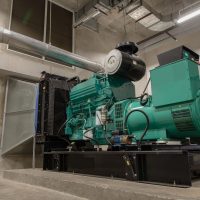Understanding Federal UST Requirements for Emergency Power Systems

The maintenance and regulation of underground storage tanks (USTs) for emergency power systems are critical components for various types of establishments such as hospitals, data centers, and other mission-critical operations. The federal UST regulations under the Resource Conservation and Recovery Act (RCRA), overseen by the Environmental Protection Agency (EPA), set the benchmark for ensuring safe storage and management of petroleum or hazardous substances. Read on to learn what the EPA has to say about these critical mechanisms. For help with installation and removal, lining and coating, compliance testing and other critical UST services, reach out to Lutz Petroleum (Florida) or Herbert Lutz Co., Inc. (New Jersey) for helpful advice and quality service from a team of highly qualified and experienced UST professionals.
What Are USTs in the Context of Emergency Power?
Underground Storage Tanks (USTs) serve as the primary reservoirs for fuels like diesel that power emergency generators. The integrity of these tanks is paramount to ensure that emergency power systems can operate effectively during times of power outage or catastrophic failure.
Who Needs to Comply With These EPA Regs?
Any facility that houses USTs storing petroleum or certain hazardous substances must comply with federal regulations. These rules cover UST design, construction, installation, and even closure. Key federal UST requirements include:
-
Leak Detection – Facilities must implement leak detection systems and routinely monitor these systems to ensure they are functional. This rule is in place to minimize the risks of environmental contamination.
-
Spill and Overfill Prevention – The EPA mandates the use of specific devices to prevent spills and overfills. These mechanisms are designed to automatically shut off the flow of fuel when the tank is nearly full, thereby preventing overflows.
-
Corrosion Protection – All UST systems installed after December 1988 must have corrosion protection, which generally comprises a coating or jacket made of non-corrodible material. Older systems must be retrofitted to meet these specifications.
-
Operator Training – UST operators must be trained to handle emergencies, including spill response and leak detection. This training should comply with the federal guidelines.
-
Record-keeping and Reporting – Facilities are required to maintain extensive records of their UST operations, including but not limited to leak detection, spill prevention, and results of any inspections. Any release or leak incidents must be reported immediately to the appropriate authorities.
State-Specific Regulations
In addition to federal rules, many states have their own sets of UST regulations that go above and beyond what is required by the EPA. It’s important for facility managers to be aware of these state-specific rules, as non-compliance can result in severe penalties.
Help With UST Regulatory Compliance in New Jersey and Florida
Failure to comply with federal UST requirements can lead to substantial penalties, including hefty fines and legal action. Moreover, neglecting these regulations can result in environmental degradation, posing long-term risks to public health and safety. For help with UST installation, removal, and related issues in New Jersey or Florida, contact Herbert Lutz Co., Inc. at 908-862-8888 or Lutz Petroleum at 954-971-5222.